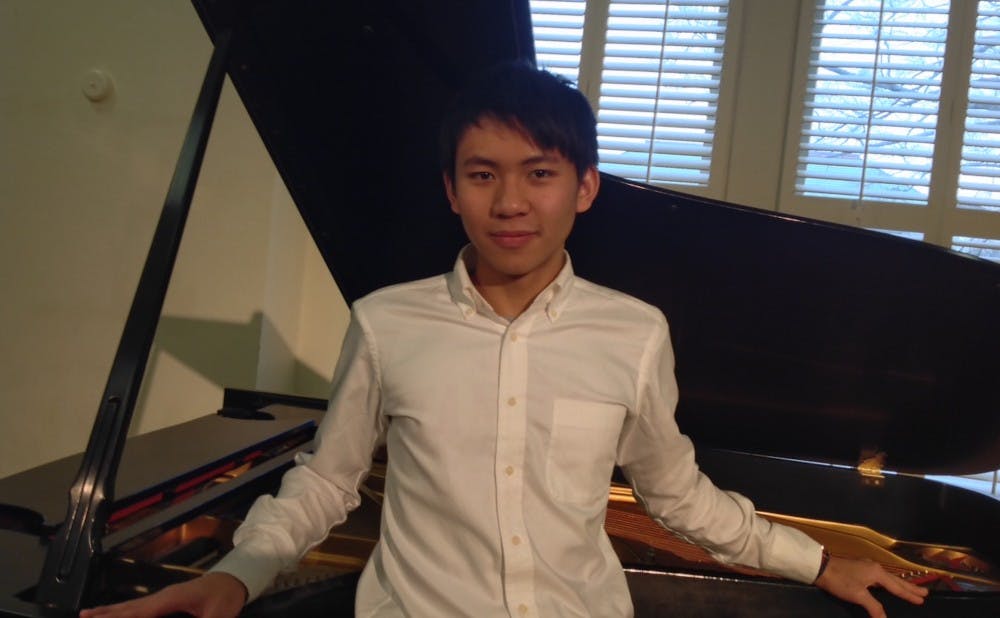While talking with music instructor Pei-Fen Liu about one of her students, senior Jerry Chia-Rui Chang, a number of superlatives kept cropping up: “extraordinary,” “fantastic,” “dedicated.” But by the end of our conversation, Liu had settled on one word to describe the senior, whom she has taught piano since his first semester at Duke: “fearless.”
Chang will perform Wednesday with the Duke Symphony Orchestra for the ensemble’s final concert of the semester. In doing so, he has already reached one of the high-water marks for student musicians as a two-time winner of DSO’s annual concerto competition. Although it is not unprecedented, it is a rare feat within the department, one that Liu attributed in part to her student’s attitude.
“A lot of students feel if they put too much effort into this or this, then the other areas will be [over]shadowed,” Liu said, pointing to the difficulty of balancing schoolwork with music. “But Jerry is fearless.”
For Wednesday’s concert, Chang will play Franz Liszt’s Piano Concerto No. 1 in E flat major, accompanied by the orchestra. Beginning at 8 p.m. in Baldwin Auditorium, the concert is centered around the theme of “American Masters,” featuring works from American composers Leonard Bernstein, George Walker and Aaron Copland in addition to the concerto.
The first time Chang won the concerto competition — as a first-year student in 2015 — he played Frédéric Chopin’s Piano Concerto No. 2 in F minor. This year’s piece, he said, presented a contrast from his performance three years ago.
“That piece is more lyrical,” Chang said of the Chopin concerto. “I kind of wanted to try different kinds of styles, so for the Liszt concerto, it’s more flashy, more exciting.”
His preparation for the concerto began last summer, though his practice did not start in earnest until the school year, having had other pieces on his plate. For Chang, piano competitions are nothing new; he had already competed in numerous international contests even before arriving at Duke or winning the first concerto competition. But he acknowledged that the Liszt piece presented its own set of challenges as a more technically advanced concerto, something that is no surprise coming from Liszt, known as one of the most virtuosic pianists in history.
This year’s concerto also has one major difference from the first one that has nothing to do with the music: This time, Chang has a thesis to defend not long after the concert is over.
“I’m probably more stressed this time, because I’m a senior,” Chang, who is a statistics major, said. “So it’s a lot busier for me in terms of schoolwork.”
Nevertheless, Chang began rehearsing alongside DSO last week, about one week after the orchestra began practicing the concerto on its own. As opposed to having a guest soloist, who may not be available to practice with the orchestra ahead of the concert, having a student soloist presented students the rare opportunity to play combined as soloist and orchestra. Professor of music and DSO director Harry Davidson remarked on the unique nature of adapting Liszt’s piece in this setting.
“In many ways, this is kind of an episodic concerto, in that there are these utterances by the orchestra and the solo and you have these long sections,” Davidson said, describing Liszt’s writing as “quasi-improvisatory.” “It’s not something where you can sit there and count X number of bars.”
Like Chang, many students in DSO are not music majors, instead using music as a passion and an extension to their academic studies. Both Davidson and Liu commented on the openness of DSO’s competitions, including the concerto competition — which began over 20 years ago — and the student composition competition, which began more recently. These competitions, Davidson said, create an air of excitement within the music department. Liu praised the variety of competition musicians encounter, since the concerto competition is open to any instrument, whether voice, piano, violin or otherwise.
Chang expressed a similar sentiment when reflecting on his own concerto experience.
“I think, by participating in the concerto competition, it’s a way for me to still keep my pursuit in musical activity,” Chang said. “So even though I’m not a music major, I still got a chance to play the piano, I still got a chance to work with a piano professor.”
The professors emphasized, however, that plenty of deserving musicians do not end up winning the competition. Stories like Chang’s are rare, requiring equal doses of skill, circumstance and old-fashioned luck — and fearlessness doesn’t hurt.
“It’s a snapshot,” Davidson said of the competition. “You’ve got these specific people who are auditioning at a given time, so that’s a factor. You can never determine who your competition will be. ... You never really know.”
Duke Symphony Orchestra’s “American Masters” is free and begins at 8 p.m. in Baldwin Auditorium. For more information about the concert or DSO, visit dukesymphony.com.
Get The Chronicle straight to your inbox
Signup for our weekly newsletter. Cancel at any time.

